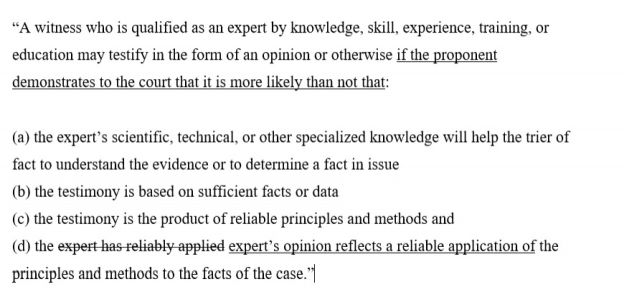Q: What do federal litigators need to know about the recent update to Federal Rule of Evidence 702?
A: On December 1, 2023, a significant update was made to Federal Rule of Evidence 702, which governs the admissibility of expert testimony in U.S. federal courts. This revision brings about important changes of which federal litigators need to be aware to effectively navigate expert matters.
Rule 702 serves as a guideline for federal courts in determining the admissibility of expert testimony. It ensures that expert witnesses possess the necessary credentials and that their testimony is reliable and relevant to the case at bar. In employment cases, the Rule often is invoked when parties rely on experts to provide specialized knowledge pertaining to discrimination, workplace practices, economic gains and losses, or lifetime earnings expectancy, to name some examples.
The December 1 update to Rule 702 more closely defines the criteria for admitting expert testimony in federal courts. It highlights the requirement for experts to depend on reliable methodologies and principles when forming their opinions. The revised language places a greater emphasis on the reliability of expert testimony, helping to reduce the risk of unsubstantiated or speculative claims. Rule 702 now states as follows (updated language marked):

As stated, an expert may testify about "scientific, technical, or other specialized knowledge [that] will assist the trier of fact to understand the evidence or to determine a fact in issue." Daubert v. Merrell Dow Pharmaceuticals, Inc., 509 U.S. 579, 589 (1993) 589 citing FRE 702(a). Derived from the landmark U.S. Supreme Court case, the Daubert Standard outlines the criteria for judges' consideration in deciding to admit expert testimony. This standard has long required judges to act as "gatekeepers," ensuring that expert evidence is based on sound scientific principles and methodologies.
The updated language in Rule 702 merely reemphasizes the judiciary's gatekeeping responsibility per Daubert, calling on judges to scrutinize expert testimony a bit more rigorously by relying on the following factors in their analyses: (1) whether the expert's theory or technique can be tested, (2) whether it has been subjected to peer review and publication, (3) the known or potential error rate and (4) the general acceptance of the methodology within the relevant scientific community. The revised rule encourages experts to explain their reasoning and the factual basis for their opinions, allowing the court to evaluate their testimony more effectively.
The content of this article is intended to provide a general guide to the subject matter. Specialist advice should be sought about your specific circumstances.
We operate a free-to-view policy, asking only that you register in order to read all of our content. Please login or register to view the rest of this article.

